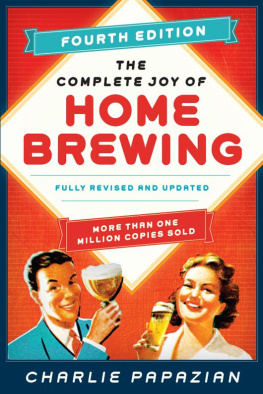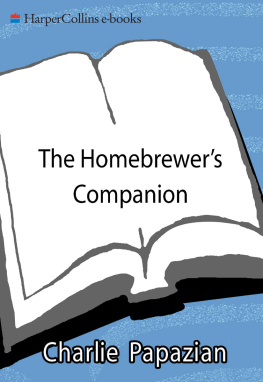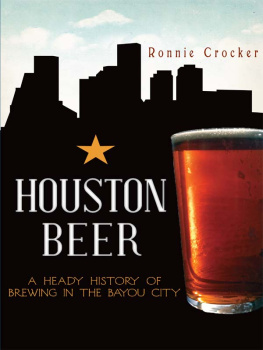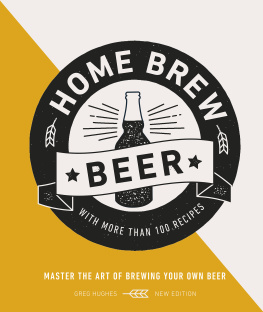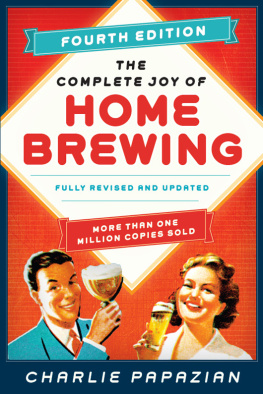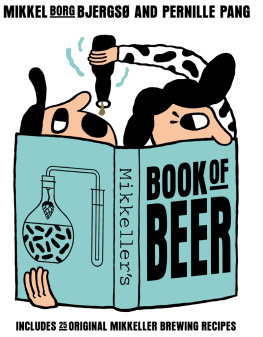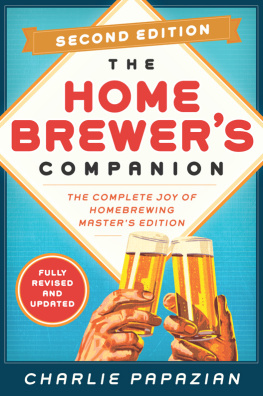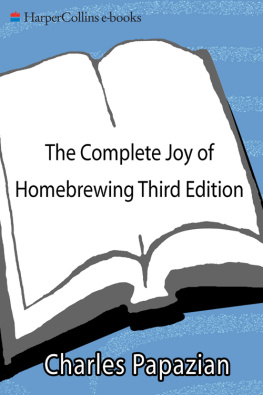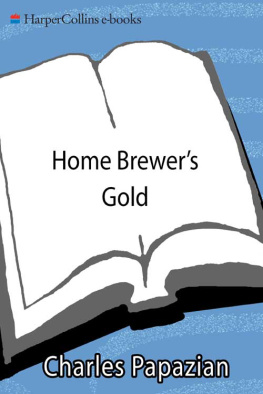
Warning: This book, if loaned, may never be returned.
The Complete Joy of Homebrewing, Fourth Edition, is dedicated to all of my students, both young and old. You have taught me much more than I have taught you. I thank you for the inspiration given to me.
I especially thank my wife, Sandra, and daughter, Carla, who are the real joys in my life.
And finally, thank you to the hundreds of Brewers Association staff whom Ive had the pleasure to work with since 1978. You have been the foundation that has helped create the positive change we enjoy as American beer culture.
Whatever suits you, tickles me plum to death.
W. JENSEN
You never know til you check it out.
C. L. MATZEN
A beer with balls!
J. A. ESPO ESPOSITO
Oh, my souls on fire.
J. A. STONER
You never know.
L. PRINCE
Are you kidding me?
J. TELISCHAK
Charlies here.
G. CONNER
Relax. Dont worry. Have a homebrew.
ANON.
Whats this?
C. A. CARLSON
Just right, but getting better.
M. L. ALLMON
The best beer youve ever made.
A. AVILA
P.F.G.
T. G. TEAGUE
Zymurgy!
M. F. MONAHAN
Mmmm, Bom.
S. R. R. PAPAZIAN
CONTENTS
How Charlie Papazian can change your life
(With help from his friend Michaelthats me)
Possession of this book means you are in for a good time. If you dont actually own it yet, buy it immediately. The secrets of good beer are within, but we are talking more than recipes. This is a lifestyle manual, a philosophical tract, and a work of subversive literature. This book is based on the many explorations of Charlie Papazian. Before I met Charlie, I had been told that he was a remarkably resourceful, practical man. When he picked me up at the airport for the first time, more than 20 years ago, I saw a man who clearly did not believe in wasting money on a new car. I have on one occasion seen Charlie ride a hired elephant, but he looks like a man who might usually travel by magic carpet. Or perhaps a genie who emerges from a bottle of beer to make your wishes come true.
The author should be called Good Time Charlie. To think, this man graduated with a degree in nuclear engineering. The world had a narrow escape. He could have blown us all into Outer Space, judging from some of the beers he brews. Its just as well that he removed himself from his native New Jersey, where his experiments might have endangered heavily populated metropolitan areas. He has for many years lived out of harms way in Boulder, Colorado. He has a tepee there. I have wondered why, but some questions yield no answer.
It has been argued that the pre-Columbian Native Americans did not brew, preferring to relax with a pipe of peace. Some homebrewers have tried to combine the two approaches, but Charlie has a peaceful nature already. Rather than putting his engineering degree to some Strangelovian misuse, he became an elementary school teacher, and a very good one at that. I have seen past pupils greet him with what I can best describe as affectionate awe. You will, too, once he has taught you to brew.
Brewing, like cooking, can be enjoyable at any level. You can stick to favorites, or go for gold. The choice is yours, and you can stop where you like. Homebrewers everywhere have fun, and enjoy saving money, but their real motivation in the United States is usually to make a style of beer that is a challenge to them, or one that is not readily available in their state.
Can homebrews match commercial beers? I have occasionally commented that many homebrewers in the United States are more knowledgeable than some of the professionals. The analogy I would make is with sports-car buffs and line managers in Detroit. The hobbyist has encountered every kind of engine or gearbox, and knows how to improvise and be creative. The line manager may in some instances know only the model to which his plant is dedicated.
Homebrewers are sociable, gregarious. They have clubs with witty names: the vulgar acronym BURP (Brewers United for Real Potables; Washington, D.C.); the plain punny Foam Rangers (Houston, Texas); the literary Maltose Falcons (San Francisco). I seem forever to be going to their parties, often in odd locations. I particularly remember one in a hangar full of microlite aircraft, while another involved a side trip to Cape Kennedy.
Being around homebrewers means being drawn into their many enthusiasms. For some years, I was enlisted to the support of a softball team called The Boulder Brewers, despite their games being about five thousand miles from my home in London. On another occasion, I found myself speaking at a fundraising dinner for a modern dance group. More recently, Charlie introduced me to the Slow Food movement, at whose Salone de Gusto he and I found ourselves promoting beer and American cheese to an audience of Italians. Faced with a challenge like that, he wore a coat and tie; quite a change for a man I once saw dressed as a blueberry pie.
Because we beer activists have a good time, we try to be tolerant when people suggest that our passion is misspent. Its only beer. How can it be that important to you? Isnt all beer the same? Do people put the same questions to a lover of fine wines? I dont think so. It is understood that wines are complex and varied, and that a devotee would grievously miss these pleasures if they were removed.
Beer is the most civilized of drinks. It was man as the hunter-gatherer, yet to civilize, who invented wine. How did civilization begin? With a beer, of course, at least six thousand years ago. Mr. Hunter-Gatherer collected fruits, most of which have only a short season. When he attempted to store what he had gathered, the fruits rottedbecame wine, which is not very nutritious. Perhaps in search of something with a longer season, and more nutrition, humans began to farm the land. Their first crop was grain, and their first recipe was for beer. This happened in the Fertile Crescent of the ancient world.
The first brewers grew the grain and made the beer. Yes, they were homebrewers. Beer was made on farms, at country mansions, castles, monasteries, and inns as the art of brewing spread west through Europe. These people were homebrewers, too. What kind of beer did they make?
That depended upon the time and place. Not only malted grain, but also raw; not only barley but also wheat and rye were used, each providing its own taste and texture. The agents of aroma, flavor, and preservation have included not only hops but also juniper berries, cherries and a wide variety of roots, barks, and flowers. Even today, a handful of winy-tasting beers are fermented by wild yeasts; an acidic few by mixed cultures; a substantial group by fruity ale yeasts; and the majority by more thorough lager strains.
Every valley had its own raw materials and climate, every brewer his own recipes and methods. Almost all beer was sold only in its own village. What a delight that must have been. In Europe, only in Belgium does a hint of that diversity survive.
What happened to diversity? With the emergence of mass-marketed golden lager as a national brand, beginning in America in the 1870s, almost every other style of beer has been in jeapordy of being washed away.
The first defiance of this tide came from two men on opposite sides of the Atlantic. In Scotland, Peter Maxwell Stuart inherited his familys castle, restored its brewery, and started to market his Traquair House Ale. In California, Fritz Maytag gave a new life to Anchor Steam, the only brewery in America at that time not making a golden lager.The tide began to turn in the 1970s. I would draw your attention to the following: Senator Alan Cranston, of California; President Carter; Charlie Papazian; the four founders of the Campaign for Real Ale; Michael Jackson (thats me); Charlie Finkel; and Jack McAuliffe.
Next page
